
Therapeutic Advances in Infectious Disease
Scope & Guideline
Unlocking innovative solutions in infectious disease management.
Introduction
Aims and Scopes
- Infectious Disease Epidemiology and Public Health:
Research focusing on the trends, prevalence, and risk factors associated with infectious diseases in various populations, emphasizing the need for effective public health interventions. - Clinical Management and Treatment Advances:
Investigations into novel therapeutic approaches, treatment protocols, and clinical outcomes for various infectious diseases, including drug-resistant infections and emerging pathogens. - Microbial Pathogenesis and Resistance Mechanisms:
Studies exploring the mechanisms of microbial virulence, resistance to antimicrobials, and the implications for treatment strategies. - Fungal and Parasitic Infections:
Dedicated research on the diagnosis, treatment, and epidemiological aspects of fungal and parasitic infections, with a focus on their growing significance in clinical practice. - HIV/AIDS and Related Co-infections:
Research targeting the complexities of HIV/AIDS management, co-infections, and the socio-behavioral factors influencing treatment and prevention. - Innovative Diagnostic Techniques:
Exploration of new diagnostic methodologies, including molecular techniques and point-of-care testing, to improve the identification and management of infectious diseases. - Global Health Challenges and Strategies:
Addressing infectious diseases within the context of global health, including the impact of socio-economic factors and health inequities on disease spread and management.
Trending and Emerging
- COVID-19 Research and Long-term Effects:
A significant increase in studies addressing the implications of COVID-19, including long-term health effects, treatment strategies, and public health responses. - Antimicrobial Stewardship and Resistance Management:
Growing attention on strategies to combat antimicrobial resistance, including stewardship programs and innovative treatment approaches for resistant infections. - Mental Health Impacts of Infectious Diseases:
Emerging research on the psychological effects of infectious diseases, particularly in the context of pandemics and chronic infections, highlighting the importance of holistic care. - Telemedicine and Digital Health Solutions:
Increased exploration of telehealth and digital health interventions for managing infectious diseases, particularly in resource-limited settings, as a response to the COVID-19 pandemic. - Community-based Health Interventions:
Focus on community engagement and participatory approaches to improve health outcomes related to infectious diseases, emphasizing local knowledge and practices. - Global Health Equity and Access to Care:
Heightened awareness of health disparities and the need for equitable access to infectious disease prevention and treatment services, particularly in low-resource settings.
Declining or Waning
- Traditional Antibiotic Treatment Protocols:
Research on conventional antibiotic regimens is becoming less prominent as the focus shifts toward innovative therapies, combination treatments, and addressing antibiotic resistance. - Non-communicable Disease Co-infections:
There seems to be a reduction in studies specifically addressing the intersection of non-communicable diseases with infectious diseases, as the journal leans more towards acute infectious disease management. - Historical Perspectives on Infectious Diseases:
Less emphasis on historical analyses and retrospective studies of infectious disease outbreaks, possibly due to the urgent need for current and actionable research. - Vaccine Development for Established Diseases:
There is a noticeable decline in research dedicated solely to vaccines for already established infectious diseases, as the focus is shifting towards novel vaccines for emerging pathogens. - In-depth Case Studies from Limited Geographies:
Fewer publications are focusing on localized case studies, indicating a trend towards broader epidemiological studies that encompass wider geographic and demographic perspectives.
Similar Journals
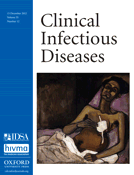
CLINICAL INFECTIOUS DISEASES
Transforming knowledge into practice for better health.Clinical Infectious Diseases, published by Oxford University Press Inc, is a premier journal in the fields of infectious diseases and microbiology, distinguished by its esteemed Q1 ranking in both categories as of 2023. Since its inception, the journal has served as a vital platform for disseminating cutting-edge research and significant advancements in the diagnosis, treatment, and prevention of infectious diseases. With a broad scope encompassing clinical trials, epidemiological studies, and public health research, it targets a diverse readership, including researchers, healthcare professionals, and students. The journal's robust reputation is underscored by its impactful contributions to scientific understanding, making it a critical resource for those striving to combat infectious diseases globally. Clinical Infectious Diseases is not open access but offers various subscription options, ensuring comprehensive access to its high-quality content. With a historical continuity from 1985 to present, the journal remains at the forefront of medical research, paving the way for future innovations in the field.
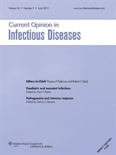
CURRENT OPINION IN INFECTIOUS DISEASES
Unveiling the Latest in Infectious Disease DiscoveriesCURRENT OPINION IN INFECTIOUS DISEASES, published by Lippincott Williams & Wilkins, is a premier journal that focuses on the latest developments and understanding in the field of infectious diseases. With its ISSN 0951-7375 and E-ISSN 1473-6527, this journal has gained recognition for its pivotal role in advancing knowledge from 1988 to its current publications in 2024. Boasting an impressive Q1 ranking in both Infectious Diseases and the Medical Microbiology category, it holds a reputable position among the top journals in the field. The journal serves as an essential resource for researchers, professionals, and students alike, providing them with timely reviews, analyses, and perspectives that shape contemporary practice and policy. While lacking open access options, it ensures a critical examination of emerging trends and unique insights that foster informed discussions. With its consistently high impact factor, CURRENT OPINION IN INFECTIOUS DISEASES remains a vital platform for thought leaders and innovators navigating the complexities of infectious disease research.

GERMS
Bridging disciplines to combat infectious diseases effectively.GERMS is a multidisciplinary journal published by the EUROPEAN ACAD HIV-AIDS & INFECTIOUS DISEASES, dedicated to advancing knowledge in the fields of epidemiology, immunology, infectious diseases, and microbiology. Since its inception in 2011, the journal has provided a crucial platform for researchers and practitioners to share innovative studies, clinical findings, and public health insights, with an eye on improving health outcomes globally. With an ISSN of 2248-2997 and a consistent publication trajectory leading up to 2024, GERMS is recognized in the third quartile across several categories, reflecting its growing impact and relevance in the scientific community. Authors and readers benefit from a range of access options, fostering the dissemination of vital research findings. As a journal situated in Romania, it also addresses regional health challenges while contributing to the broader discourse on infectious diseases and public health. GERMS is not just a repository of knowledge, but a vital resource for those engaged in combating infectious diseases and promoting health equity.
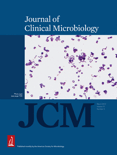
JOURNAL OF CLINICAL MICROBIOLOGY
Navigating the Complexities of Microbial PathogensJOURNAL OF CLINICAL MICROBIOLOGY, published by the American Society for Microbiology, stands as a premier resource for researchers and professionals in the field of medical microbiology. With an illustrious history dating back to 1975, this journal has consistently provided high-impact research, reflecting its status in the Q1 category among microbiology (medical) journals, and an impressive Scopus rank of 14 out of 140, placing it in the 90th percentile. The journal's commitment to unveiling foundational and innovative studies greatly contributes to understanding human health challenges posed by microbial pathogens. Researchers can expect rigorous peer-reviewed articles that cover a spectrum of topics, from diagnostic methods to clinical epidemiology, fostering a deeper understanding of microbiology's role in healthcare. While this journal does not offer open access options, its substantial impact factor underscores its relevance in shaping the conversation in clinical microbiology. The JOURNAL OF CLINICAL MICROBIOLOGY is indispensable for anyone dedicated to advancing their knowledge and practical skills in microbiology.

ISRAEL JOURNAL OF VETERINARY MEDICINE
Pioneering Research in Veterinary Medicine and Animal CareThe Israel Journal of Veterinary Medicine, published by the Israel Veterinary Medical Association, serves as a vital resource for researchers, professionals, and students in the fields of veterinary medicine and animal science. With a commitment to advancing knowledge across diverse veterinary disciplines, this journal plays a crucial role in disseminating significant findings and innovations that influence both local and global veterinary practices. Although it currently holds a Q4 ranking in both the Animal Science and Zoology and Veterinary (miscellaneous) categories, the journal's open access policy, enabling free availability of articles, aspires to increase its accessibility and engagement among the academic community. The journal's convergence of research from 2007 to 2024 showcases its dedication to continuously contributing to the evolving landscape of veterinary science.
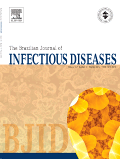
Brazilian Journal of Infectious Diseases
Transforming clinical practice with cutting-edge studies.The Brazilian Journal of Infectious Diseases, published by Elsevier Brazil, is a premier open-access journal dedicated to advancing research and clinical practice in the field of infectious diseases. Since its inception in 2001, this journal has been pivotal in disseminating innovative studies and reviews that inform healthcare professionals and researchers alike. With an impressive impact factor reflected by its ranking in the second quartile for Infectious Diseases and third quartile for Medical Microbiology in 2023, the journal ranks #127 out of 344 in medicine – infectious diseases and #61 out of 140 in medical microbiology, showcasing its reputable standing in the scientific community. The Brazilian Journal of Infectious Diseases invites contributions that highlight significant findings, novel methodologies, and critical reviews aimed at enhancing patient care and public health initiatives. With an international readership and a focus on pressing issues in infectious diseases, it serves as an essential platform for knowledge exchange and collaboration among scholars and practitioners across Brazil and beyond. By reinforcing the importance of open access to scientific literature, this journal not only promotes transparency but also enhances the global discourse surrounding infectious diseases.

Annals of Clinical Microbiology and Antimicrobials
Pioneering discussions that shape the future of healthcare.Annals of Clinical Microbiology and Antimicrobials, published by BMC, is a leading open-access journal that has been fostering scientific discourse in the fields of microbiology and infectious diseases since its inception in 2002. With an established reputation for excellence, this journal is positioned in the prestigious Q1 category across multiple disciplines, including Infectious Diseases, Medicine (miscellaneous), and Medical Microbiology as of 2023. This journal serves as a vital platform for researchers, healthcare professionals, and students, promoting the latest advancements in clinical microbiology and antimicrobial research. Access to its invaluable content is open to all, reflecting the commitment to disseminate knowledge universally. The Annals of Clinical Microbiology and Antimicrobials is based in the United Kingdom and continues to pave the way for innovation and discussions that shape the future of clinical practices in microbiology.

Mediterranean Journal of Infection Microbes and Antimicrobials
Innovating solutions for a healthier tomorrow.Mediterranean Journal of Infection Microbes and Antimicrobials is a distinguished open-access journal published by GALENOS PUBL HOUSE, dedicated to advancing the understanding of infectious diseases and microbiology. Since its inception in 2011, this journal has been a vital resource for researchers, professionals, and students interested in the intricate world of microbes and their impacts on human health. With its ISSN 2147-673X, the journal has progressively gained visibility, although it currently holds a Q4 ranking in multiple categories including Immunology and Microbiology, and Infectious Diseases for the year 2023. The journal operates from its headquarters in Istanbul, Turkey, and features a rich array of articles that contribute to the field’s body of knowledge. As a platform enhancing the accessibility of research, it invites submissions from global contributors to foster collaboration and innovation in tackling microbial challenges.

Hepatitis Monthly
Unveiling breakthroughs in hepatitis management.Hepatitis Monthly, published by BRIEFLAND in the Netherlands, is a pivotal journal in the fields of hepatology and infectious diseases. Established in 2007, it continues to make significant contributions to the understanding and management of hepatitis and related viral infections with a publication timeline extending through to 2024. Aiming to disseminate high-quality research, the journal serves as a forum for groundbreaking studies and innovations essential for healthcare professionals, researchers, and students alike. While it currently holds Q4 rankings in both hepatology and infectious disease categories, its ongoing commitment to addressing pressing health issues makes it an important resource in the academic community. Although it operates under a traditional access model, Hepatitis Monthly not only publishes original research articles, reviews, and case studies but also encourages the exchange of knowledge that helps shape future research directions and clinical practices. As it continues to explore the complexities surrounding viral hepatitis, this journal invites researchers to contribute to its mission of advancing scientific understanding and improving patient care.
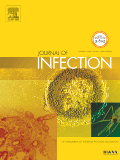
JOURNAL OF INFECTION
Exploring Innovations in Microbial ResearchJOURNAL OF INFECTION is a premier academic publication in the fields of infectious diseases and medical microbiology, published by W B SAUNDERS CO LTD. With a profound impact factor and established since 1979, this journal serves as a crucial resource for researchers, clinicians, and policy-makers seeking to advance knowledge and understanding of infectious processes and their management. The JOURNAL OF INFECTION holds an impressive position in the academic hierarchy as reflected by its Q1 quartile rankings in both Infectious Diseases and Microbiology (medical) for 2023, further underscored by its Scopus rankings: #2 in Medical Microbiology and #5 in Medical Infectious Diseases, placing it in the 98th percentile overall. While the journal does not offer Open Access options, it provides a comprehensive outlet for innovative research, reviews, and clinical insights that drive the field forward. Published from the United Kingdom, it attracts a global readership keen on staying at the forefront of infectious disease research, making it an essential addition to any academic and clinical library.